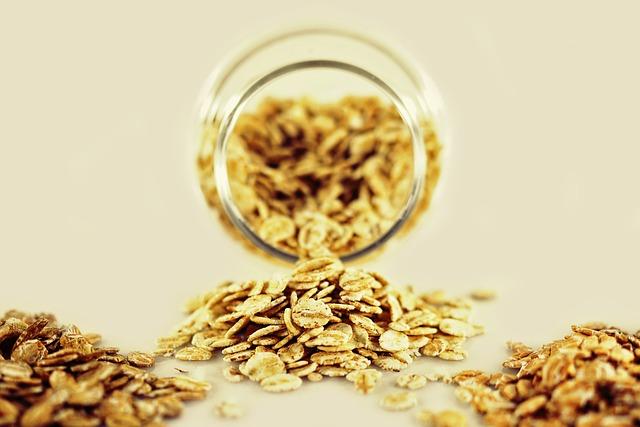In a world where the pace of life often demands convenience over contemplation, the role of whole foods in our daily wellness emerges as a timeless anchor amidst the whirlwind of dietary trends and quick-fix solutions. Whole foods, in their natural and unprocessed forms, offer a symphony of flavors and nutrients that resonate with the body’s innate wisdom. As we peel back the layers of modern living, there is a growing recognition of the profound impact these foods have on our physical vitality and mental clarity. This exploration into the realm of whole foods invites us to reconnect with the earth’s bounty, fostering a harmonious balance that nourishes both body and spirit. Join us as we delve into the vibrant world of whole foods and uncover their essential role in cultivating a life of wellness, resilience, and authenticity.
Nourishing Body and Soul with Natures Bounty
Whole foods are the unsung heroes of our daily routines, providing a tapestry of flavors and nutrients that cater to both our physical health and emotional well-being. In a world overflowing with processed options, these natural treasures offer a path back to simplicity and balance. By embracing whole foods, we not only nurture our bodies with essential vitamins and minerals but also reconnect with the earth’s seasonal rhythms. This connection enhances our meals, turning them into a celebration of nature’s bounty. Imagine the rich colors and textures of a salad crafted from fresh, local produce, or the earthy warmth of a soup made with root vegetables harvested at their peak. These meals do more than satisfy hunger; they become an experience that enriches our lives.
Consider incorporating more whole foods into your diet through simple, mindful practices such as:
- Choosing seasonal produce: Opt for fruits and vegetables that are in season for maximum flavor and nutrition.
- Exploring local markets: Support local farmers and discover new ingredients by shopping at farmers’ markets.
- Prioritizing minimally processed foods: Aim for ingredients that are as close to their natural state as possible.
- Experimenting with whole grains: Introduce quinoa, farro, or barley into your meals for added fiber and nutrients.

Unveiling the Secrets of Whole Foods for Optimal Health
Incorporating whole foods into your daily routine can be transformative for your health. These foods, unprocessed and unrefined, retain their natural nutrients, offering a multitude of benefits that are often lost in processed alternatives. Imagine a diet rich in vibrant fruits, hearty vegetables, and wholesome grains, each contributing to a balanced and nourishing lifestyle. Whole foods are not just fuel; they are a source of vital nutrients that promote wellness and vitality.
- Improved Digestion: Whole foods are rich in dietary fiber, which aids in digestion and helps maintain a healthy gut.
- Enhanced Energy Levels: Natural carbohydrates and proteins provide sustained energy throughout the day.
- Better Immunity: Packed with essential vitamins and minerals, they boost your immune system, keeping illnesses at bay.
Embracing a diet rich in whole foods is not about restrictive eating; it’s about choosing options that work harmoniously with your body. As you embark on this journey, explore the endless possibilities of delicious and nutritious meals that whole foods can offer. Let them be the cornerstone of your daily wellness routine, providing you with the essential tools for a vibrant and healthy life.

Practical Tips for Incorporating Whole Foods into Your Routine
Transitioning to a diet rich in whole foods can be a seamless experience with a few practical strategies. Start by incorporating more fruits and vegetables into your meals. You can make this change more accessible by prepping a variety of colorful, ready-to-eat options at the beginning of the week. Consider adding fresh berries to your morning cereal or enjoying a crunchy apple as an afternoon snack. For lunch and dinner, aim to fill half your plate with vibrant veggies, whether it’s a hearty salad or roasted seasonal produce.
- Batch Cook Whole Grains: Prepare a big batch of quinoa, brown rice, or farro to use throughout the week. These can be the base for salads, stir-fries, or as a side dish.
- Swap Processed Snacks: Replace chips and cookies with nuts, seeds, or air-popped popcorn. These alternatives not only satisfy cravings but also provide essential nutrients.
- Explore New Recipes: Try out recipes that focus on whole food ingredients. This could be a new vegetable soup, a grain bowl, or a homemade energy bar.
Moreover, integrating whole foods into your diet doesn’t have to mean giving up your favorite dishes. Instead, find ways to enhance them with nutrient-rich ingredients. For instance, add whole grain pasta to your spaghetti night or incorporate beans and lentils into your chili recipe. By making these small adjustments, you’ll gradually build a more wholesome diet that supports daily wellness.
Crafting a Balanced Diet with Whole Food Essentials
Incorporating whole foods into your diet is a powerful step toward enhancing daily wellness. Whole foods are minimally processed, rich in nutrients, and often closer to their natural state, offering a multitude of health benefits. They play a pivotal role in providing essential vitamins, minerals, and antioxidants, which are crucial for maintaining optimal health. By focusing on whole foods, you not only fuel your body with high-quality nutrients but also reduce the intake of additives and preservatives that can burden your system.
- Fruits and Vegetables: Packed with fiber, vitamins, and antioxidants, these are the cornerstone of a balanced diet.
- Whole Grains: Foods like quinoa, brown rice, and oats provide sustained energy and improve digestion.
- Lean Proteins: Sources such as beans, lentils, and lean meats help in muscle repair and overall body maintenance.
- Healthy Fats: Avocados, nuts, and olive oil support brain function and hormone production.
- Dairy or Dairy Alternatives: These contribute to bone health and can be a source of probiotics when opting for fermented options.
Balancing your meals with these essentials can lead to improved energy levels, better digestion, and a more robust immune system. By making mindful choices and prioritizing whole foods, you’re setting a foundation for lifelong health and wellness.
Key Takeaways
As we conclude our exploration into the vibrant world of whole foods and their role in daily wellness, it becomes clear that these natural wonders are more than just sustenance; they are the building blocks of vitality and resilience. Each bite of a crisp apple or a handful of vibrant spinach carries with it the potential to nourish not just our bodies, but our minds and spirits as well. By embracing the bounty of whole foods, we invite a symphony of nutrients into our lives, harmonizing with our innate desire for balance and well-being. As we stand at the crossroads of choice in our daily meals, let us remember the power of simplicity and the profound impact of nature’s gifts. Here’s to a journey of health that is as wholesome as it is rewarding, one delicious bite at a time.




